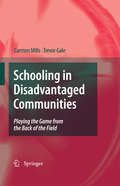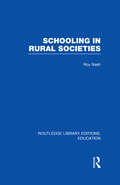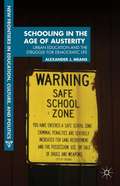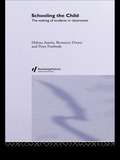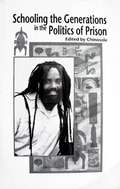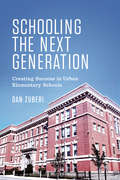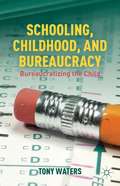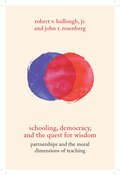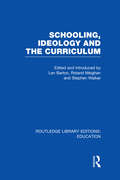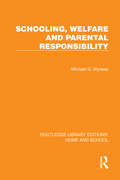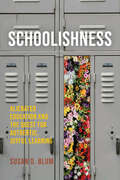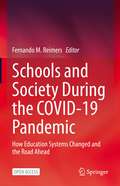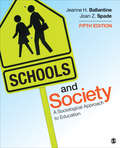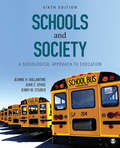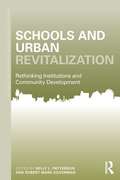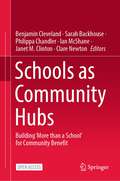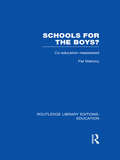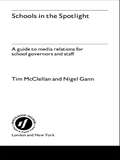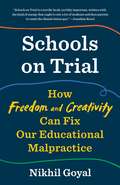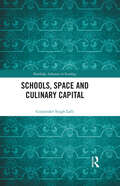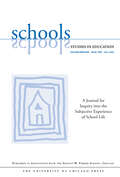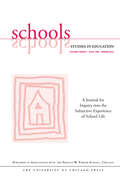- Table View
- List View
Schooling in Disadvantaged Communities
by Carmen Mills Trevor GaleBased on a study of one secondary school located in a disadvantaged community in Australia, this book provides a different perspective on what it means to 'play the game' of schooling. Drawing on the perspectives of teachers, parents and students, this book is a window through which to explore the possibilities of schooling in disadvantaged communities. The authors contend that teachers, parents and students themselves are all involved in the game of reproducing disadvantage in schooling, but similarly, they can play a part in opening up opportunities for change to enhance learning for marginalised students. Rather than only attempting to transform students, teachers should be also be concerned to transform schooling; to provide educational opportunities that transform the life experiences of and open up opportunities for all young people, especially those disadvantaged by poverty and marginalised by difference. The book is also designed to stimulate understanding of the work of Bourdieu as well as of a Bourdieuian approach to research. Seeing transformative potential in his theoretical constructs, it airs the possibility that schools can be more than mere reproducers of society.
Schooling in Rural Societies (Routledge Library Editions: Education)
by Roy NashIn industrialized societies the needs of people living in remote and sparsely populated areas are easily overlooked, whilst in developing countries the needs of the rural population are at once so obvious and so enormous that our practical concern is blunted. In this volume it is clearly demonstrated that the relationship between environment and schooling is no less pertinent in rural areas than urban areas, although most recent attention has been directed towards the latter. Roy Nash seeks to redress the balance and in this wide-ranging and comprehensive analysis he examines the educational needs of rural people both in the declining periphery of urban Europe and in the resource-starved areas of the developing world.
Schooling in the Age of Austerity: Urban Education And The Struggle For Democratic Life (New Frontiers In Education, Culture And Politics Ser.)
by Alexander J. MeansThrough a case study in a Chicago public school, Means demonstrates that, despite the fragmentation of human security in low-income and racially segregated public schools, there exist positive social relations, knowledge, and desire for change that can be built upon to promote more secure and equitable democratic futures for young people.
Schooling the Child: The Making of Students in Classrooms
by Peter Freebody Helena Austin Bronwyn DwyerWhat is a child?How is the concept of childhood defined?This book aims to explore these perennial and complex questions by looking at the way in which society constructs and understands childhood. The authors focus in particular on the school, a key location within which social and cultural notions of childhood are defined and performed.The book is divided into three major parts:Part 1 frames the accepted notions of childhood and schooling, and introduces ethnomethodological analysis as a tool to rethink current versions of the child.Part 2 focuses on how school students become members of a category within the institution of the classroom. The authors explore this idea through transcripts of talk between teachers and students, and amongst students themselves in two classroom studies.Part 3 looks at the materials of education, concentrating specifically on children's texts. The authors examine how such texts portray a notion of the child within the story, and also assume a notion of the child as reader of the story.This important book shows how much is at stake for children in accepting adults' deep-seated notions of childhood. It will be of great interest to educational researchers and policy makers, sociologists of childhood, teachers and student teachers.
Schooling the Generations in the Politics of Prison
by ChinosoleSchooling the Generations in the Politics of Prison
Schooling the Next Generation
by Dan ZuberiPublic schools are among the most important institutions in North American communities, especially in disadvantaged urban neighbourhoods. At their best, they enable students to overcome challenges like poverty by providing vital literacy and numeracy skills. At their worst, they condemn students to failure, both economically and in terms of preparing them to be active participants in a democratic society.In Schooling the Next Generation, Dan Zuberi documents the challenges facing ten East Vancouver elementary schools in diverse lower-income communities, as well as the ways their principals, teachers, and parents are overcoming these challenges. Going beyond the façade of standardized test scores, Zuberi identifies the kinds of school and community programs that are making a difference and could be replicated in other schools. At the same time, he calls into question the assumptions behind a test score-driven search for "successful schools." Focusing on early literacy and numeracy skills mastery, Schooling the Next Generation presents a slate of policy recommendations to help students in urban elementary schools achieve their full potential.
Schooling, Childhood, and Bureaucracy
by Tony WatersIn exploring the relationship between bureaucratic schooling and the individual child, Waters describes the persistence of educational inequality, child development, and the nature of bureaucracy. The conclusions point out how education bureaucracies frame both schooling and childhood as they relentlessly seek to create ever more perfect children.
Schooling, Democracy, and the Quest for Wisdom: Partnerships and the Moral Dimensions of Teaching
by Robert V Bullough John R RosenbergIn response to growing concern in the 1980s about the quality of public education across the United States, a tremendous amount of energy was expended by organizations such as the Holmes Group and the Carnegie Forum to organize professional development schools (PDS) or “partner schools” for teacher education. On the surface, the concept of partnering is simple; however, the practice is very costly, complex, and difficult. In Schooling, Democracy, and the Quest for Wisdom, Robert V. Bullough, Jr. and John R. Rosenberg examine the concept of partnering through various lenses and they address what they think are the major issues that need to be, but rarely are, discussed by thousands of educators in the U.S. who are involved and invested in university-public school partnerships. Ultimately, they assert that the conversation around partnering needs re-centering (most especially on the purposes of public education), refreshing, and re-theorizing.
Schooling, Ideology and the Curriculum (Routledge Library Editions: Education)
by Stephen Walker Len Barton Roland MeighanAlthough the different contributions to this book range over a wide spectrum of substantive issues, they share a common interest. This is a concern to explore the ways in which notions of the relations between theory and practice, between belief and action, can be used to develop three kinds of sensitivity in the sociology of education. A sensitivity towards how school systems are created, maintained and made to function; towards developing a more refined, critical and constructive awareness of the reliability and validity of descriptions, analyses and explanations offered in this field of study; and a sensitivity towards the ways in which changes take place within the education system and how the insights and realisations generated in the discipline might be used to control such occurrences.
Schooling, Welfare and Parental Responsibility (Routledge Library Editions: Home and School)
by Michael G. WynessIn the 1990s, issues of child protection, child abuse and delinquency had generated public and academic concerns over the ability of adults to underwrite the physical, moral and social welfare of children. At the same time, recent educational reform had provoked debate around the shifting balance of power between those most involved in child development – parents and teachers. Originally published in 1996, Schooling, Welfare and Parental Responsibility brings these two agenda together within a coherent theoretical framework and offers an empirical analysis grounded in perspectives of both parents and teachers.The book draws on recent British, European and North American research and provides the reader with an up-to-date account of the current state of affairs between parents and teachers at the time. Within a context of recent educational and social policy reform and drawing on interview material from parents and teachers, the author examines the common understandings of the concept of parental responsibility. Debates on sex education, the ‘interventionist’ welfare state, and the state of parental anxiety are explored through the accounts provided.Schooling, Welfare and Parental Responsibility is an eminently readable synthesis of theory, policy and empirical data and today can be read by students, teachers and welfare practitioners in its historical context.
Schoolishness: Alienated Education and the Quest for Authentic, Joyful Learning
by Susan D. BlumIn Schoolishness, Susan D. Blum continues her journey as an anthropologist and educator. The author defines "schoolishness" as educational practices that emphasize packaged "learning," unimaginative teaching, uniformity, constant evaluation by others, arbitrary forms, predetermined time, and artificial boundaries, resulting in personal and educational alienation, dependence, and dread.Drawing on critical, progressive, and feminist pedagogy in conversation with the anthropology of learning, and building on the insights of her two previous books Blum proposes less-schoolish ways of learning in ten dimensions, to lessen the mismatch between learning in school and learning in the wild. She asks, if learning is our human "superpower," why is it so difficult to accomplish in school? In every chapter Blum compares the fake learning of schoolishness with successful examples of authentic learning, including in her own courses, which she scrutinizes critically.Schoolishness is not a pedagogical how-to book, but a theory-based phenomenology of institutional education. It has moral, psychological, and educational arguments against schoolishness that, as Blum notes, "rhymes with foolishness."
Schools and Society During the COVID-19 Pandemic: How Education Systems Changed and the Road Ahead
by Fernando M. ReimersThis open access book provides an analysis of the effects of the COVID-19 Pandemic on diverse education systems, and of the results of the policies adopted to sustain educational opportunities. Through a series of diverse national case studies, the book examines the preexisting fragilities and vulnerabilities in educational structures which shaped the nature of the varied responses, around the world, to teaching and learning during the worst crisis in public education in recent history.The chapters in the book take stock of how educational opportunities changed in various education systems around the world as a result of the Covid-19 pandemic, answering the question of what did education systems, and societies, learn about education as a result of the pandemic.The book covers diverse education systems, with varying levels of resources and facing distinct education challenges, including Brazil, Chile, Finland, Japan, Mexico, Norway, Portugal, Russia, Singapore, Spain, South Africa, and the United States.
Schools and Society: A Sociological Approach to Education
by Jeanne H. Ballantine Joan Z. SpadeSchools and Society: A Sociological Approach to Education, Fifth Edition by Jeanne H. Ballantine and Joan Z. Spade is a comprehensive anthology featuring classical readings on the Sociology of Education, as well as original essays by notable contemporary scholars. Assigned as a main text or a supplement, this fully updated Fifth Edition uses the open systems approach to provide readers with a framework for understanding and analyzing the book’s range of topics. The editors, both experienced instructors in this subject, have chosen articles that are highly readable, and that represent the field’s major theoretical perspectives, methods, and issues.
Schools and Society: A Sociological Approach to Education (The\wadsworth Sociology Reader Ser.)
by Jeanne H. Ballantine Joan Z. Spade Jenny M. StuberThe authors are proud sponsors of the 2020 SAGE Keith Roberts Teaching Innovations Award—enabling graduate students and early career faculty to attend the annual ASA pre-conference teaching and learning workshop. This comprehensive anthology features classical readings on the sociology of education, as well as current, original essays by notable contemporary scholars. Assigned as a main text or a supplement, this fully updated Sixth Edition uses the open systems approach to provide readers with a framework for understanding and analyzing the book’s range of topics. Jeanne H. Ballantine, Joan Z. Spade, and new co-editor Jenny M. Stuber, all experienced researchers and instructors in this subject, have chosen articles that are highly readable, and that represent the field’s major theoretical perspectives, methods, and issues. The Sixth Edition includes twenty new selections and five revisions of original readings and features new perspectives on some of the most contested issues in the field today, such as school funding, gender issues in schools, parent and neighborhood influences on learning, growing inequality in schools, and charter schools.
Schools and Society: A Sociological Approach to Education (The\wadsworth Sociology Reader Ser.)
by Jeanne H. Ballantine Joan Z. Spade Jenny M. StuberThe authors are proud sponsors of the 2020 SAGE Keith Roberts Teaching Innovations Award—enabling graduate students and early career faculty to attend the annual ASA pre-conference teaching and learning workshop. This comprehensive anthology features classical readings on the sociology of education, as well as current, original essays by notable contemporary scholars. Assigned as a main text or a supplement, this fully updated Sixth Edition uses the open systems approach to provide readers with a framework for understanding and analyzing the book’s range of topics. Jeanne H. Ballantine, Joan Z. Spade, and new co-editor Jenny M. Stuber, all experienced researchers and instructors in this subject, have chosen articles that are highly readable, and that represent the field’s major theoretical perspectives, methods, and issues. The Sixth Edition includes twenty new selections and five revisions of original readings and features new perspectives on some of the most contested issues in the field today, such as school funding, gender issues in schools, parent and neighborhood influences on learning, growing inequality in schools, and charter schools.
Schools and Urban Revitalization: Rethinking Institutions and Community Development (Community Development Research and Practice Series)
by Robert Mark Silverman Kelly L. PattersonNew research in community development shows that institutions matter. Where the private sector disinvests from the inner city, public and nonprofit institutions step in and provide engines to economic revitalization and promote greater equity in society. Schools and Urban Revitalization collects emerging research in this field, with special interest in new school-neighborhood partnerships that lead today’s most vibrant policy responses to urban blight.
Schools as Community Hubs: Building ‘More than a School’ for Community Benefit
by Benjamin Cleveland Ian McShane Sarah Backhouse Philippa Chandler Janet M. Clinton Clare NewtonThis open access book brings together research on the planning, design, governance and management of schools as community hubs—places that support the development of better-connected, more highly integrated, and more resilient communities with education at the centre. It explores opportunities and difficulties associated with bringing schools and communities closer together, with a focus on the facilities needed to accommodate shared experiences that generate social capital and deliver reciprocal benefits.This book discusses the expanded roles of schools, and investigates how schools may offer more to their communities—historically, currently and into the future—with respect to the role of the built environment in situating community activities and services.Organised around four sections, it showcases important areas of development in the field via an interdisciplinary approach, which weaves together empirical research with theoretical insights and practical examples. This book not only highlights the challenges associated with the development of schools as community hubs but offers evidence-based insights into how to overcome such hurdles to develop community-facing schools into the future.
Schools for the Boys?: Co-education reassessed (Routledge Library Editions: Education)
by Pat MahonyDo girls do better in single-sex or co-educational schools? Up to now, discussion has centred on girls’ academic achievements in single or mixed-sex groups, but Pat Mahony’s research clearly demonstrates that this is not the only issue, and that co-education is damaging for girls socially as well as academically. She challenges the argument that co-education is desirable because it is more normal. Her research reveals that it is normal for girls to be ‘put down’ in class, to be verbally abused and sexually harassed by boys, and yes, this will be their ‘normal’ experience as women. But does this justify the way girls are treated in schools? Pat Mahony goes on to explore some of the reasons behind this state of affairs and suggests that the answer lies in sexual politics, not biology. The book concludes with practical suggestions for bringing about change in schools, including case-studies from existing projects.
Schools in the Spotlight: A Guide to Media Relations for School Governors and Staff
by Nigel Gann Mr Nigel Gann Tim McClellan Tim McclellanWhat role does a school play in a community and society?This book examines the need for educational establishments to review their position in the local community and to develop strategies to deal with the management of their image. Increasing parental choice means that schools must begin to adopt marketing concepts and tell people what is happening both inside and outside the classroom.Techniques to generate, revisit and challenge a school's ethos are discussed together with ways of getting this message across to the wider community. Effective management of a school's image through judicious handling of the media can lead to better results, higher self-esteem for staff and pupils and a greater recognition of a school's contribution to a local community.This book gives practical guidance on how to identify potential news items and how to convince local newspapers, television and radio organisations to use the story. The book contains many examples of how schools have put comprehensive framework to effective media communication and how to avoid potential pitfalls.
Schools on Trial
by Nikhil GoyalAn all-in attack on the American way of education and a hopeful blueprint for change by one of the most passionate and certainly youngest (twenty) writers of this subject. Are America's schools little more than cinder-block gulags that spawn vicious cliques and bullying, negate creativity, and true learning and squelch curiosity in their inmates, um, students? Nikhil Goyal, a journalist and activist all of twenty years old whom the Washington Post has dubbed a "future education secretary" and Forbes has named to its 30 Under 30 list, passionately thinks so, and in this book he offers both a scathing indictment of our teach-to-the-test-while-killing-the-spirit educational assembly line and maps out a path for all of our schools to harness children's natural aptitude for learning by creating an atmosphere conducive to freedom and creativity. He prescribes an inspiring educational future that is thoroughly democratic and experiential, and one that utilizes the entire community as a classroom.From the Hardcover edition.
Schools on Trial: How Freedom and Creativity Can Fix Our Educational Malpractice
by Nikhil GoyalSchools on Trial is an all-in attack on the American way of education and a hopeful blueprint for change by one of the most passionate and certainly youngest writers on this subject. Are America’s schools little more than cinder-block gulags that spawn vicious cliques and bullying, negate creativity and true learning, and squelch curiosity in their inmates, um, students? Nikhil Goyal—a journalist and activist all of twenty years old, whom The Washington Post has dubbed a “future education secretary” and Forbes has named to its 30 Under 30 list—definitely thinks so. In this book he both offers a scathing indictment of our teach-to-the-test-while-killing-the-spirit educational assembly line and maps out a path for all of our schools to harness children’s natural aptitude for learning by creating an atmosphere conducive to freedom and creativity. He prescribes an inspiring educational future that is thoroughly democratic and experiential, and one that utilizes the entire community as a classroom.
Schools on Trial: How Freedom and Creativity Can Fix Our Educational Malpractice
by Nikhil GoyalSchools on Trial is an all-in attack on the American way of education and a hopeful blueprint for change by one of the most passionate and certainly youngest writers on this subject. Are America’s schools little more than cinder-block gulags that spawn vicious cliques and bullying, negate creativity and true learning, and squelch curiosity in their inmates, um, students? Nikhil Goyal—a journalist and activist all of twenty years old, whom The Washington Post has dubbed a “future education secretary” and Forbes has named to its 30 Under 30 list—definitely thinks so. In this book he both offers a scathing indictment of our teach-to-the-test-while-killing-the-spirit educational assembly line and maps out a path for all of our schools to harness children’s natural aptitude for learning by creating an atmosphere conducive to freedom and creativity. He prescribes an inspiring educational future that is thoroughly democratic and experiential, and one that utilizes the entire community as a classroom.
Schools, Space and Culinary Capital (Routledge Advances in Sociology)
by Gurpinder Singh LalliThis book introduces the notion of culinary capital to investigate socialisation and school mealtime experiences in an academy school based in the UK. Drawing on interviews collated from children, teachers and staff within the school, the text sheds light on food insecurity in society and schools as being major issue in educational policy. The book examines schools as a microcosm for society with school food space being the playground for socialisation. It shows how forms of culinary capital can be extended in the school dining hall where social space is negotiated with notions of inclusion and exclusion during mealtime. The book uses gender, class and race to understand the school dining hall as a space where culinary capital can be exchanged and learnt. Thorough research accompanied by ethnographic visuals, field notes and observations, it also explores the sensory impact of school gardens. As such the book will be of interest to students, teachers, school leaders, educators and policy makers in the fields of Education, Sociology, Social Policy and Food Studies.
Schools, volume 19 number 2 (Fall 2022)
by SchoolsThis is volume 19 issue 2 of Schools. Schools: Studies in Education provides a forum for classroom educators to describe and meditate on the complex experiences of school life. The journal publishes scholarly articles, reflective essays, and stories that convey how human relationships, thoughts, and emotions shape the meaning of what happens when learning actually occurs. Historical documents in “From the Archives” feature intriguing excerpts from works that provide insight into contemporary issues. Opinion pieces in “On the Horizon” feature arguments about the future of education planning and policy. Reviews critically evaluate books, films, art exhibitions, concerts, and other events that have some bearing on the meaning and value of education.
Schools, volume 20 number 1 (Spring 2023)
by SchoolsThis is volume 20 issue 1 of Schools. Schools: Studies in Education provides a forum for classroom educators to describe and meditate on the complex experiences of school life. The journal publishes scholarly articles, reflective essays, and stories that convey how human relationships, thoughts, and emotions shape the meaning of what happens when learning actually occurs. Historical documents in “From the Archives” feature intriguing excerpts from works that provide insight into contemporary issues. Opinion pieces in “On the Horizon” feature arguments about the future of education planning and policy. Reviews critically evaluate books, films, art exhibitions, concerts, and other events that have some bearing on the meaning and value of education.
